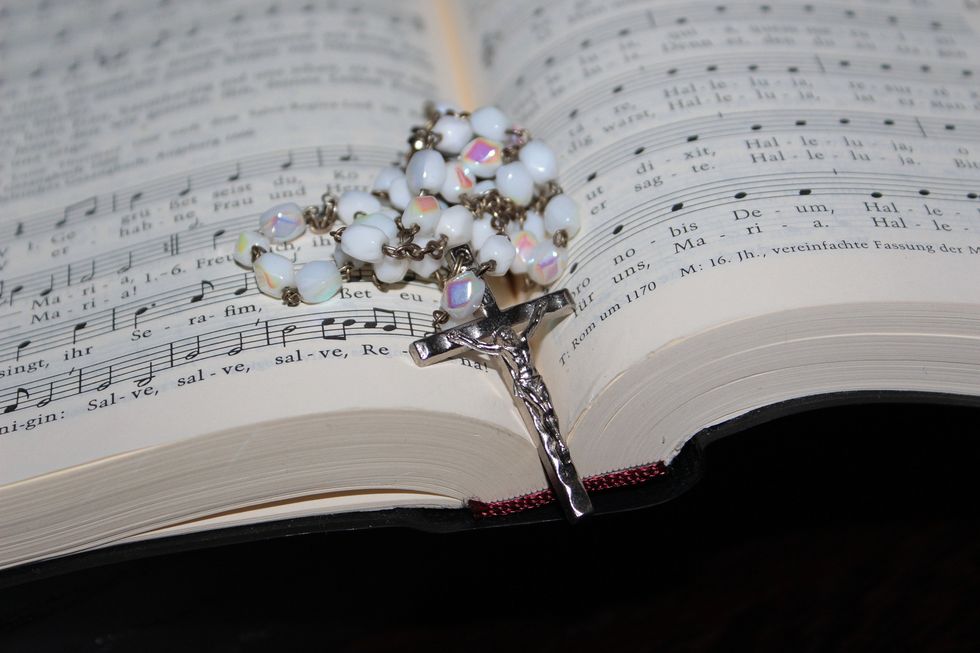I grew up Roman Catholic because the Colombian side of my family was culturally, very religious. My grandmother always prayed with her special rosary, strung with glass beads and a weighty metal crucifix. When I turned five, she gave me a matching, plastic pink one and a children’s Bible.
My parents taught me to kneel beside my bed every night to pray. I would pray for the health and well-being of my family, and for harmony and happiness in the world.
I would pray like I was writing a letter, starting with “Dear God” and then silently signing my name at the end (so God would know the prayer was from me, and not some other little girl).
As soon as I was old enough, I started attending CCD one night every week. CCD stands for Confraternity of Christian Doctrine, an association whose aim is to teach children about Roman Catholicism through a religious education program.
Roman Catholicism is a branch of Christianity. The Catholic Church is set up hierarchically, meaning the leader of the Catholic church is the Pope, and then underneath him are cardinals, archbishops, bishops, and finally priests (who lead Sunday mass).
As a Roman Catholic, I believe that the Virgin Mary gave birth to Jesus, and that Jesus died on the cross to absolve us from sin, rose from the dead three days later (the miracle/mystery of faith), and will one day return to earth to pass judgement on the living and the dead.
The chief difference in doctrine between other sects of Christianity and the Catholic Church is transubstantiation. Every Sunday mass, the priest invokes the words of Jesus from the Last Supper—the night before Jesus was hanged on the cross.
The priest quotes from the bible, “And he took bread, gave thanks and broke it…saying, 'This is my body given for you; do this in remembrance of me,'” and “‘This is the cup of my Blood, the Blood of the new and everlasting covenant; it will be shed for you and for all, for the forgiveness of sins.’”
Roman Catholics believe that that the bread and wine used during the church service actually transform into Christ’s body and blood when the priest blesses it.
These are fundamental aspects of religious faith that I have always believed. However, at university, I have encountered a great deal of resistance to my religious beliefs. Meeting people from different parts of the country, with different belief systems, has impacted me greatly during my first year at college.
The majority of people I have met at University are not at all religious. They are either atheists (those who do not believe in God) or they simply do not practice any religion. As someone who grew up incredibly close to God and a rigid belief system, the idea of not having any religion was initially shocking and even slightly disturbing to me.
Some of the people I talked to in my first few days of university expressed their disgust or disdain at the fact that I was Roman Catholic. One told me that he felt that believing in any sort of religion was downright dumb, because “all of it is hokey believing and mysterious miracles that can be explained away by science.”
Another peer expressed that they found Catholicism to be one of the most hateful religions, and couldn’t believe that I was so deeply entrenched in the “brainwashing” that goes on in the Catholic Church.
I had never been shamed for my religion before. Encountering people who placed no importance at all on religion, who did not include religion in their daily life, was a baffling experience. I was especially taken aback by those who viewed my religion in such a negative light. My experience with other Catholics is that they tried to spread happiness, positivity, and well wishes to everyone they came across.
However, on further reflection, I decided to take it in stride. Just because other people do not have deep spiritual lives does not mean that I should be ashamed of what I believe. Roman Catholicism has shaped my life for the better; it has taught me essential life values, like forgiveness, caring, charity, and hope.
My religion is incredibly personal to me, and while I would never ask anyone to agree with my beliefs, I am asking for tolerance and understanding. My religion does not make me stupid or brainwashed or a bad person. Religion shapes a person's beliefs, but it doesn't define them down to the core.
I'm not ashamed to be Roman Catholic. My religion is a part of me that I will never apologize for. I believe in the Catholic Church, in the forgiveness of sins, of the miracles of Jesus Christ—I won't ever sacrifice my beliefs because of others' perceptions of my faith.









































